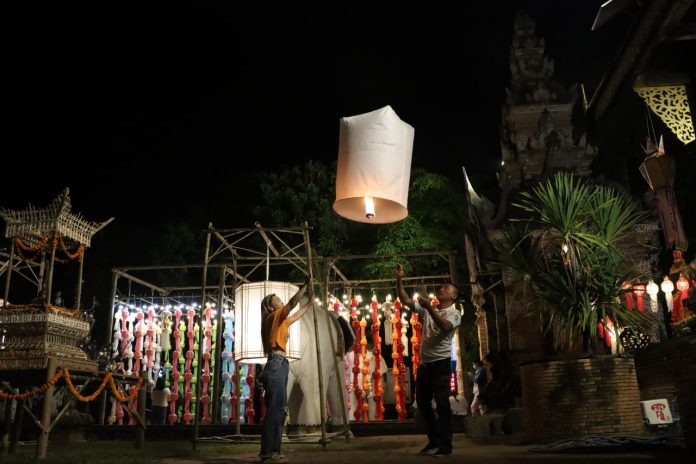Thailand’s floating lantern festival Loy Krathong was held in Chiang Mai on Nov. 15-16. Loy means to float, and Krathong are small baskets made of banana leaves decorated with flowers, candles, and incense sticks. These offerings are made to the water goddess Pra Mae Khongkha. Loy Krathong coincides with the Lanna northern Thai festival of Yi Peng. Check out our photo essay.
Newsroom: How to stop online harm and abuse in Myanmar [AUDIO]
A new cyber safety campaign called Stop Online Harm was launched in Myanmar. Its program lead Hetty joined the DVB Newsroom to discuss how it shares resources and technology tools, builds capacity, raises awareness, develops strategies, and advocates for change from global technology platforms and governments. Read more here.
Watch Newsroom on YouTube & Spotify. Listen on Audible, Apple Podcasts, Amazon Music or YouTube Music. DVB English News is available wherever you get your podcasts.
Yangon court reduces auction price of Aung San Suu Kyi’s home
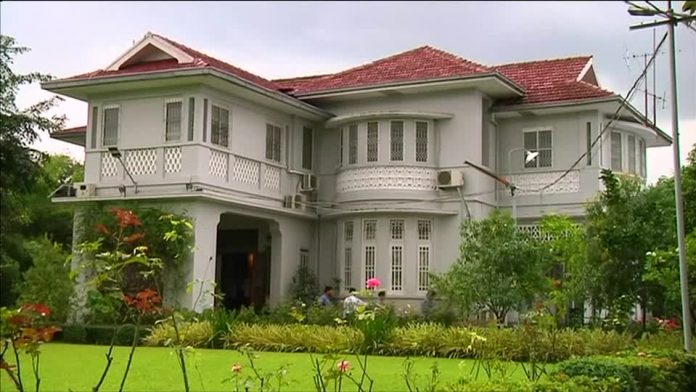
The Kamayut District Court has agreed to a proposal submitted by Aung San Oo – the estranged brother of jailed State Counsellor Aung San Suu Kyi – to lower the auction floor price for the family residence at 54 University Avenue in Yangon to 290 billion kyat ($64.4 million USD).
Aung San Suu Kyi’s legal team previously filed an objection to this request. The exact date of the next auction of the historic property, which is located in Yangon’s Bahan Township along Inya Lake, has yet to be determined.
A legal expert told DVB on the condition of anonymity that the court’s continuous granting of Aung San Oo’s requests is “inconsistent with court procedures and represents a one-sided judgment of the case.”
The residence is where Aung San Suu Kyi famously spent 15 years under house arrest, from 1989 to 2010. On Aug. 15, the Bahan Township court held a second auction for the property with a floor price of 300 billion kyat. No bids were made, which resulted in a canceled auction.
The base price for the first auction on March 20 was set at 315 billion kyat, but the Kamayut District Court reduced the floor price for the second attempt.
Aung San Suu Kyi, 79, has been held incommunicado in the capital Naypyidaw since her arrest during the military coup on Feb. 1, 2021. The jailed State Counsellor has been unable to meet with her legal team since December 2022 and has not been directly involved in decisions regarding the sale of her property.
Her legal team continues to appear at court hearings twice each month for her inheritance execution suit, attempting to prevent additional complications, according to sources close to the proceedings.
Aung San Su Kyi’s legal team makes continual requests to meet with her at Naypyidaw Prison. “Since [Aung San Suu Kyi] will get the money from the property being sold, we want to know if she agrees with and approves of these price reductions,” a source close to her legal team told DVB.
Over 1,000 landmine casualties in Myanmar; UN Security Council asked to apply more pressure on Naypyidaw
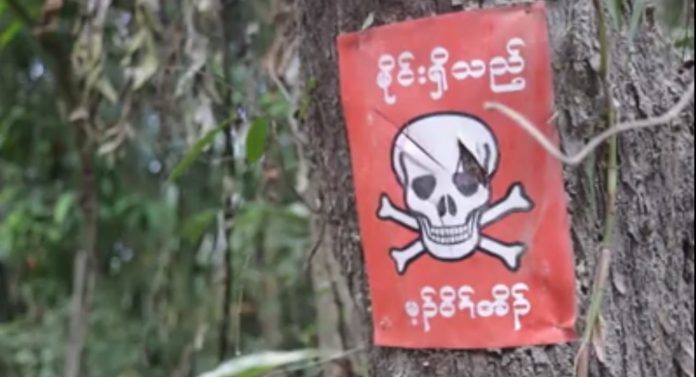
Over 1,000 landmine casualties in Myanmar – the most globally
The Landmine & Cluster Munition Monitor 2024 report released on Wednesday stated that Burma topped the global list of casualties with 1,003 civilians killed and injured from landmines and explosive remnants of war (ERW) planted by both the military and resistance groups in all 14 states and regions of the country.
“The Myanmar military’s widespread use of antipersonnel mines will threaten the lives and livelihoods of villagers now and for decades to come,” said Shayna Bauchner, Asia researcher at Human Rights Watch. “The junta’s planting of landmines in homes, villages, and farms appears designed to both terrorize and harm civilians.”
Human Rights Watch urged all armed groups in the country to stop using landmines. The Landmine & Cluster Munition Monitor documented that a total of 5,757 people were killed by landmines and ERWs worldwide in 2023. Burma is one of only four countries actively using anti-personnel mines, along with Russia, Iran, and North Korea.
UN Security Council asked to apply more pressure on Naypyidaw
The U.N. Security Council met to discuss Burma’s crisis since the 2021 military coup behind closed doors in New York City, U.S. on Wednesday. The Permanent Representative of the U.K. to the U.N. Barbara Woodward claimed that the military carried out the highest number of airstrikes over the past three months than it has in the last three years of conflict.
“They have used more improvised explosive devices, landmines and shelling in the past year than in any year since the coup,” she said. Burma’s Permanent Representative to the U.N. Kyaw Moe Tun called on the U.N. Security Council to take more action to prevent human rights violations from the military.
“We urge the U.N. member states and the international community to stop flows of arms and weapons, dual use items, jet fuel, and financial sublines to the military junta immediately,” he said, while asking the international community to reject the regime’s elections tentatively scheduled for November 2025. Burma’s envoys to the U.N. and the Association of Southeast Asian Nations (ASEAN) also briefed the meeting.
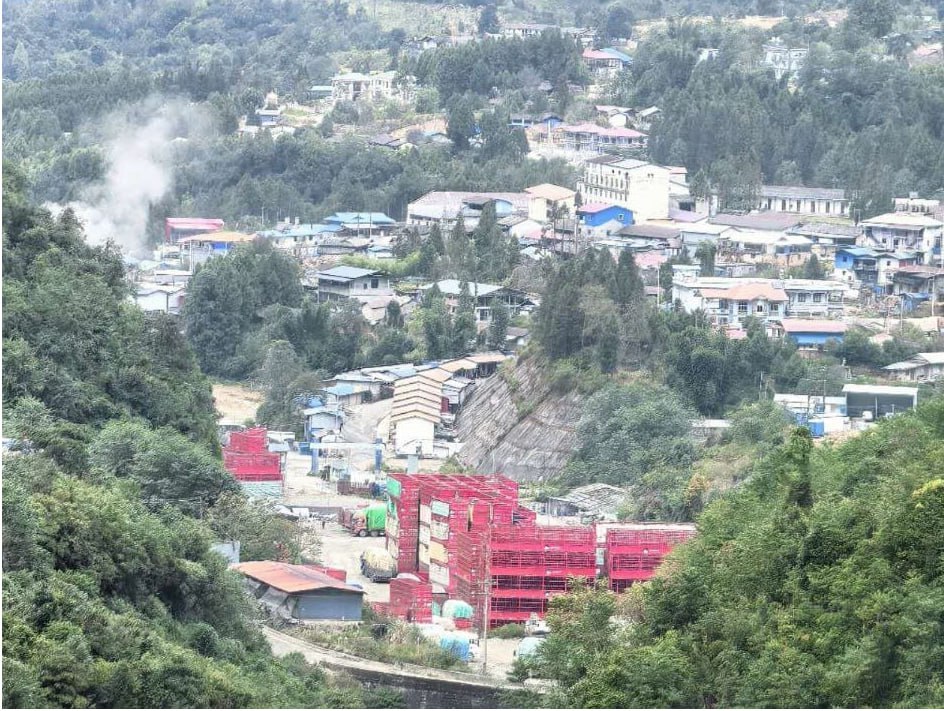
Kachin Special Region 1 now under Kachin Independence Army control
The Kachin Independence Army (KIA) and its allied People’s Defense Force (PDF) seized control of the rare earth mining town of Kanpaikti – the last border town in Kachin State under Naypyidaw’s control – in Waingmaw Township on Wednesday.
Pangwa, the capital of the special region, was seized by the KIA on Oct. 19. “We are still clearing the town. We arrested some military personnel,” a source from the KIA told DVB. “The military and its allied troops left the outposts but fought back while hiding inside buildings in the town.”
Kanpaikti is located 78 miles (126 km) east of the Kachin State capital Myitkyina along the China-Myanmar border in the Kachin Special Region 1. It was administered by the Kachin Border Guard Force (BGF) on behalf of the regime in Naypyidaw. The seizure of Kanpaikti brings the entire region under KIA control. Read more here.
News by Region
SHAN—The United Wa State Army (UWSA) stated that it handed over 1,000 people to Chinese authorities, who are suspected of being involved in cyber scams, in Tangyan Township on Tuesday. Tangyan is located 83 miles (134 km) southeast of Lashio, the biggest town in northern Shan State.
A total of 762 Chinese nationals were returned to China. Seventy-six Starlink terminals, 1,549 mobile phones and 82 computers were seized by the UWSA. In July, the UWSA deployed its troops “to prevent the spread of ongoing conflicts” in Tangyan. The U.S. Institute of Peace (USIP) told DVB that the cyber scam compounds in Tangyan operated under UWSA protection.
ARAKAN—The Arakan Army (AA) stated on Wednesday that it has transferred the seven fishing boats belonging to 20 Bangladesh fishermen to the Bangladesh Border Guard. It claimed that it arrested the fishermen and seized 15 boats for “illegal fishing” off the coast of Arakan State near the Burma-Bangladesh border on Nov. 5.
“The eight remaining fishing boats will be handed over [in the future],” a source close to AA told DVB. The AA claimed in its statement that it “sympathized” with the 20 Bangladesh fishermen who were caught illegally fishing off the coast of Arakan State.
MANDALAY—Jailed National League for Democracy (NLD) Minister of Investment and Foreign Economic Relations Thaung Tun was transferred from Obo Prison to Mandalay Hospital on Wednesday. A source at Obo Prison told DVB that he is receiving medical treatment for heart disease.
“He was returned to the prison [on the same day],” said the source. Thaung Tun, 70, was arrested on April 22, 2022. He was convicted of corruption charges and sentenced to nine years in prison. Thaung Tun also served as the National Security Advisor and chair of Myanmar Investment Commission.
NAYPYIDAW—Min Aung Hlaing claimed that at least 63 percent of Burma’s population has been surveyed in the nationwide census, which took place Oct. 1-15 but was later extended to Oct. 30. He held a meeting with officials in Naypyidaw on Tuesday to inform them that the extended census – updated to be held until the end of the year – was in order to compile voter lists for its planned elections in 2025.
“It is crucial to ensure that voter lists are error-free and accurate in the upcoming election. [It] will be conducted using the Myanmar Electronic Voting Machine system,” said Min Aung Hlaing. At least 43 people have been killed by anti-coup groups while collect data for the census.
(Exchange rate: $1 USD = 4,520 kyat)
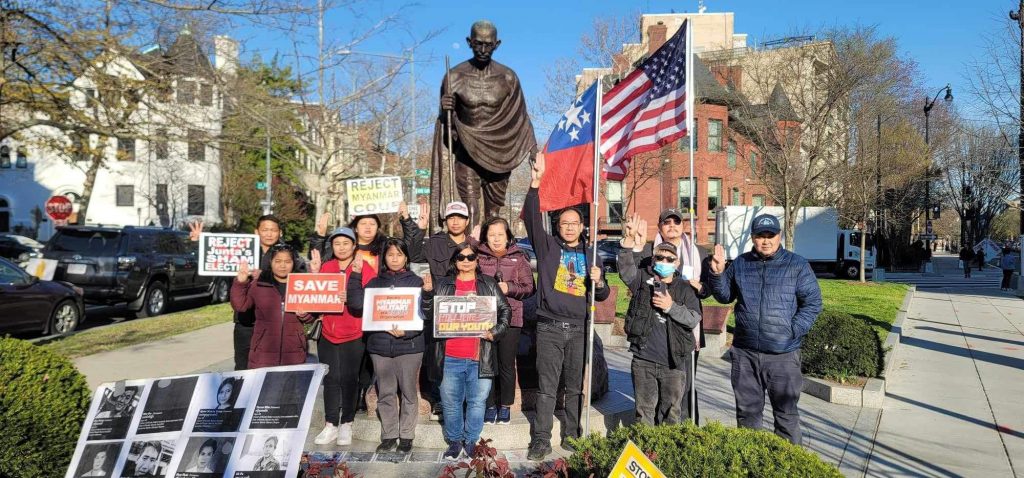
Read: India hosts military and anti-coup forces at seminar in New Delhi. Find DVB English News on X, Facebook, Instagram, Threads & TikTok. Subscribe to us on YouTube.
How to stop online harm and abuse in Myanmar

A new cyber safety campaign called Stop Online Harm was launched in Myanmar. Its program lead Hetty joined the DVB Newsroom to discuss how it shares resources and technology tools, builds capacity, raises awareness, develops strategies, and advocates for change from global technology platforms and governments. Read more here.
Kachin Special Region 1 now under Kachin Independence Army control
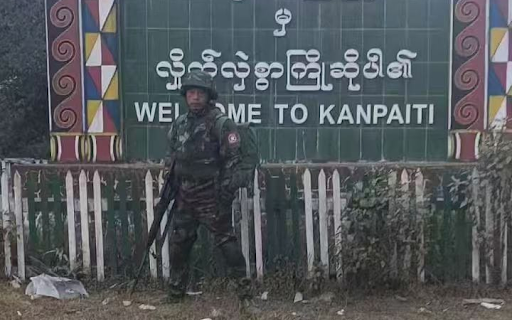
The Kachin Independence Army (KIA) and its allied People’s Defense Force (PDF) seized control of the rare earth mining town of Kanpaikti – the last border town in Kachin State under Naypyidaw’s control – in Waingmaw Township on Wednesday.
“We are still clearing the town. We arrested some military personnel,” a source from the KIA told DVB. “The military and its allied troops left the outposts but fought back while hiding inside buildings in the town.”
Kanpaikti is located 78 miles (126 km) east of the Kachin State capital Myitkyina along the China-Myanmar border in the Kachin Special Region 1, which was administered by the Kachin Border Guard Force (BGF) on behalf of the regime Naypyidaw.
The seizure of Kanpaikti brings the entire region under KIA control. Pangwa, the capital of the special region, was seized by the KIA on Oct. 19.
“I heard some [regime soldiers] are hiding in the cave along the border. The KIA is chasing them,” a resident told DVB. Local media reported that KIA-led forces launched its attack on Kanpaikti Nov. 9. Some residents had fled in anticipation.
The Kachin Special Region 1 is a hub for Myanmar’s lucrative rare earth mining, which was reportedly worth $1.4 billion USD last year. Rare earth elements are vital components used in electronics, including batteries, cameras and computer chips, as well as in glass and magnets.
Kanpaikti residents reported that 30 injured pro-regime soldiers fled into China for safety during fighting with the KIA. One man claimed that those who didn’t flee changed into civilian clothes to evacuate the town with all other residents leaving.
Myanmar Air Force jet fighters were spotted flying around but were reportedly unable to carry out airstrikes due to heavy rains and wind. Naw Bu, the KIA spokesperson, told The Irrawaddy that it plans on resuming rare earth mining operations, which have been halted since its offensive began in September.
Kachin Special Region 1 consists of Tsawlaw, Chipwi, and parts of Waingmaw Township in northeastern Kachin State. The Kachin BGF is led by Zahkung Ting Ying, 84, who ordered “strict defense measures” against the KIA in anticipation of its offensive.
A former KIA officer, Zahkung Ting Ying, led a splinter faction that joined the Communist Party of Burma in 1968 until 1989 when it collapsed and he formed the New Democratic Army-Kachin (NDA-K). He then agreed to a ceasefire with the Myanmar military in December of that year.
The military regime at the time declared the territory held by the NDA-K as the Kachin Special Region 1. In 2009, the NDA-K agreed to come under the military’s chain of command and became known as the Kachin BGF.
Under military protection, Zawkhung Ting Ying and his family grew wealthy from revenue generated by rare earth mineral mines, as well as the timber and narcotics trade into China using Pangwa and Kanpaikti border towns.
The whereabouts of Zawkhung Ting Ying is currently unknown. His home in Pangwa was sealed off by the KIA shortly after it seized the town. The KIA launched a major offensive across Kachin State on March 7. It has taken control of at least 14 towns in Kachin and northern Shan states, including in Sagaing Region, since last year.


